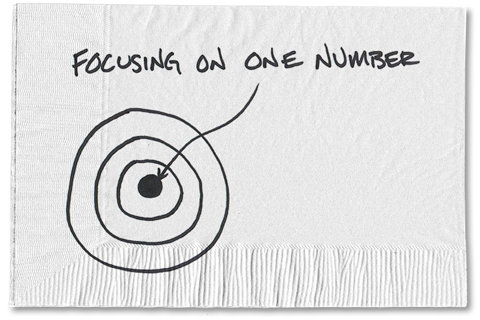
I think it’s true that if I want to improve my performance in something, I need to measure and track it. As Thomas Monson, an author and president of the Church of Jesus Christ of Latter-day Saints, said: “When performance is measured, performance improves. When performance is measured and reported back, the rate of improvement accelerates.”
I’ve certainly seen this in my life. It’s pretty amazing the difference it makes in my exercise habits when I can see on my watch how far I’ve gone and how fast I’m running. Just a little feedback sharpens my focus.
For some people, the simple act of stepping on a scale first thing in the morning and recording what it says helps manage weight.
This seems like a simple thing. In fact, when it comes to improving our financial situation, it feels as if it’s too simple. So we don’t do it. I wonder if something super simple, like tracking a single number, consistently and for a long time, may be the subtle nudge we need to improve our finances.
Most of the people I talk to, regardless of income or net worth, have no budget or financial plan. So it’s pretty clear that anything that we can do consistently will be better than the nothing we’re currently doing.
So the question I have is: How simple can we make this process and still see improvement?
What if we just tracked one number consistently, over a long period of time?
Which number would be both easy and beneficial?
The default answer is usually spending, but the idea of tracking spending makes people think of budgeting, and budgeting has a marketing problem — very few people like to do it. But it can be effective and simple.
Take 10 minutes at the end of each day and record what you spent. Use a notebook or your favorite app and track it. Over time, you start to see patterns. You learn things you didn’t know about yourself in terms of what your spending says about your priorities. That will naturally lead to change.
One of the reasons I focus on spending is that people think tracking doesn’t help. A great (or not so great) example is the time I taught a financial literacy class to people who were working their way out of the local homeless shelter. The first week, 20 people would show up. I gave them a pocket-size spiral notebook and asked them to record everything they spent for one week and to come back so we could move onto the next step. No one ever came back. After a few weeks, we canceled the class.
And it’s not just people in the homeless shelter who seem to have issues when you mention tracking spending. Most of the people I talk to who make more than $100,000 a year and have money invested think they are way beyond budgeting. So they don’t do it either.
But maybe what you spend each day is the wrong number to focus on.
What about tracking a different number like the value of your savings, investments and retirement account? Once a week, you add up the balances and write down that number. Measure it over time. Just one piece of paper with a simple line graph.
Would that lead to change?
I like this idea because it’s what many of us are focused on: having enough money saved to meet some future goal like sending your children to college or retirement. It seems to me that by just focusing on that one number, a lot of the noise goes away.
Another idea would be even simpler. Track the amount you are able to able to save each week or month. That’s a number that gets rid of the short-term variation that comes from the market and focuses clearly on something that we have control over — how much we save. In theory, if you focus on that one number, you will find ways to improve it. That could mean you will find ways to spend less, earn more, or both. Because you want to see that number go up.
Since I know many of you have tried one or all of these things, tell me what your experience has been.
- What number(s) do you track?
- How often do you track them?
- How do you remind yourself to do it?
- Have you seen improvement?
I think we all know that some improvement, any improvement, is better than standing still. Maybe something simple like tracking and measuring a single number will give us the nudge we need to be smarter about our money.
So, what’s your number?
Article source: http://bucks.blogs.nytimes.com/2013/03/25/tracking-your-finances-one-number-at-a-time/?partner=rss&emc=rss
